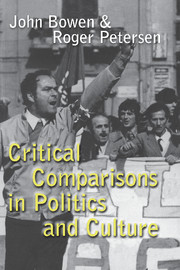Book contents
- Frontmatter
- Contents
- List of Figures
- List of contributors
- Acknowledgments
- 1 Introduction: critical comparisons
- 2 National revivals and violence
- 3 Mechanisms and structures in comparisons
- 4 Comparative methodologies in the analysis of anthropological data
- 5 The role of comparison in the light of the theory of culture
- 6 Case studies of contemporary job loss
- 7 Defining the contours of an Islamic reform movement: an essay in successive contrasts
- 8 Producing an analytic narrative
- 9 Political consciousness on Boa Ventura: 1967 and 1989 compared
- 10 Comparisons in the context of a game theoretic argument
- 11 The role of microhistories in comparative studies
- List of references
- Index of authors
- Subject index
1 - Introduction: critical comparisons
Published online by Cambridge University Press: 28 January 2010
- Frontmatter
- Contents
- List of Figures
- List of contributors
- Acknowledgments
- 1 Introduction: critical comparisons
- 2 National revivals and violence
- 3 Mechanisms and structures in comparisons
- 4 Comparative methodologies in the analysis of anthropological data
- 5 The role of comparison in the light of the theory of culture
- 6 Case studies of contemporary job loss
- 7 Defining the contours of an Islamic reform movement: an essay in successive contrasts
- 8 Producing an analytic narrative
- 9 Political consciousness on Boa Ventura: 1967 and 1989 compared
- 10 Comparisons in the context of a game theoretic argument
- 11 The role of microhistories in comparative studies
- List of references
- Index of authors
- Subject index
Summary
Why compare?
The social sciences today are torn apart by a tension between two desires: to richly describe the world, showing its complexity and variability, and to robustly model the world, showing its relationships and regularities. We argue in this volume that engaging in comparisons of a few, well-understood cases reduces this tension. We offer, in effect, a case study of an encounter between two quite different disciplines, political science and anthropology. As students of society and culture, we found that we shared a stake in discovering processes and mechanisms underlying social phenomena, and that we found small-scale comparisons critical to that effort. And yet as participants in different disciplinary traditions, we continue to debate among ourselves about how best to compare, about how to interpret the patterns perceived, and about the ultimate goals of social research.
In a series of conferences and other exchanges, a collection of political scientists and anthropologists engaged in comparative study decided to put on the table what connected us and what divided us. Though a diverse lot – our objects of study run from ritual wailing to trade union disputes to agrarian transitions – we recognized in each other the dual commitment to understanding things both in their detail and in their general implications. We included no formal modelers or atheoretical monograph writers. All of us were engaged in comparative analysis of one sort or another, but some were also highly critical of much current comparative work.
We did, admittedly, approach our encounters with some fears – about disciplinary imperialisms, or about the Other's predilections for reductionism or mindless description.
- Type
- Chapter
- Information
- Critical Comparisons in Politics and Culture , pp. 1 - 20Publisher: Cambridge University PressPrint publication year: 1999
- 3
- Cited by



